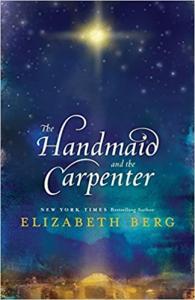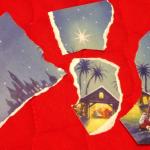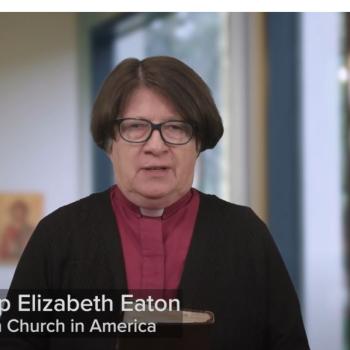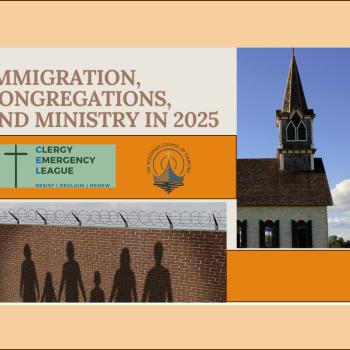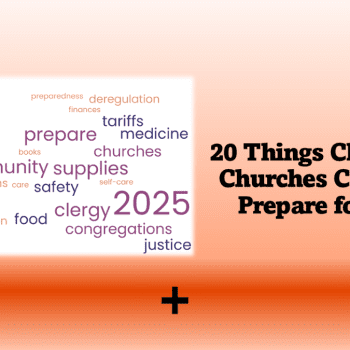They were different than us – outsiders, foreigners. Yet this little country church decided to trust the Epiphany light of Christ and welcome their gifts with hospitality and peace.
Text: Matthew 2:1-12
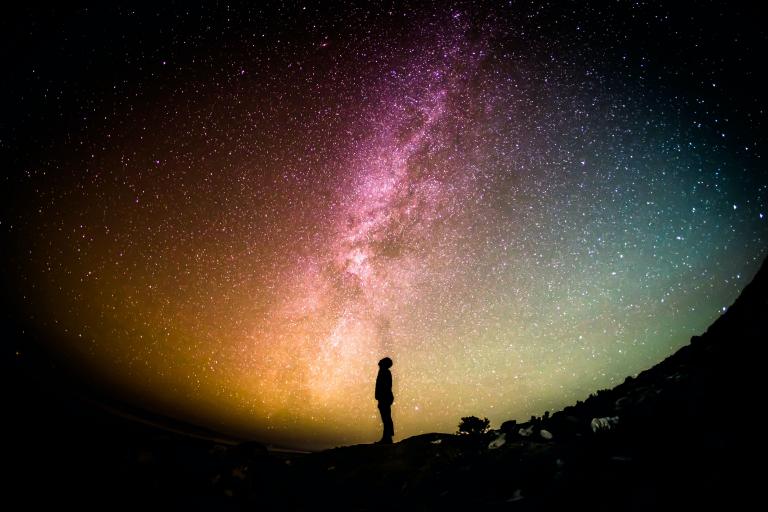
Star light, star bright, first star I see tonight . . . I wish I may I wish I might have this wish I wish tonight.
I recalled that little poem last month as I stood in a cold, wind-swept field gazing the “Christmas star.” On December 21, we saw the convergence of Jupiter and Saturn, their celestial paths aligning to create what seemed to be a singular bright star. This rare occurrence happens only once every few hundred years.
Many heralded “The Convergence” of those planets as ushering in a new era, a new beginning.
There’s something about stars that have captured the imagination of human beings from the time they gathered around ancient fires, watching the sparks fly up into the darkened sky. Long before there were Kindles and iPods, televisions and movies, or electric lights of any kind to illuminate our nights, the stars were the only light-bearers for humankind once the sun went down. The ancient ones would watch those tiny pinpricks of light, observing how the stars would seem to move gradually across the sky.
Eventually they began to connect those celestial dots and see images in the sky: great warriors, animals, gods and goddesses. Early astronomers recognized patterns of movement, enabling them to predict the location of the stars according to the time of year. They even learned to navigate their travels by the guidance of the stars.
The ancients also saw a connection between the motions of the stars and life here on Earth, a practice known as astrology.
They would try to make sense of the world around them, make predictions about significant human events by watching the signs in the skies. When they observed something out of the ordinary, it caught their attention.
The magi in Matthew’s story were both astronomers and astrologers.
They were the scientists of their day making observations and trying to interpret the meaning of what they saw. In the year 2 B.C.E. they saw the planet Jupiter, one of the brightest stars in the sky, pass very close to the star Regulus, “the King’s star” as it was known (David Levy, “Star of Wonder,” Parade magazine, 2001). When they saw this rare occurrence, they believed something amazing had happened among humankind. It was Epiphany light heralding a new era.
Today astronomers can use computer simulations to reconstruct what the stars looked like in the sky on any given night in history. They know that over a period of eight months in that year, Jupiter passed by Regulus three times, appearing to draw a crown in the sky. And then in the ninth month, Jupiter and Venus – the two brightest stars in the sky – passed so near to each other in their planetary travels that they appeared to fuse into a single brilliant star in the sky.
The Magi knew that this occurrence was nearly unheard of, so they were compelled to follow where that star seemed to lead them. That is how they came to be in Jerusalem inquiring about a newborn king.

These sages from far-away lands created quite a disturbance in Herod’s court.
Already paranoid and tyrannical, Herod panicked when the Magi told him that a king had been born. He consulted with his chief priests and scribes and they reminded him that scripture prophesied the Messiah would come from Bethlehem. So he sent the magi there, instructing them to report back so that he might “pay him homage.”
I wonder – did their internal alarms go off when he met with them in secret? Did they suspect Herod’s evil intentions lurking behind that promise of piety?
In any case, they had the information they needed and set off for the little town of Bethlehem.
Like Herod and his court, Joseph and Mary were most likely perplexed by the sudden visit of these strange men from distant lands.
Star or not, imagine how strange, how disconcerting it must have been to open the door and find these foreigners standing on their doorstep.
In her book, The Handmaid and the Carpenter, Elizabeth Berg imagines a scene where Joseph was very suspicious of these strangers. With their odd clothes, their foreign language, and their different skin tones, he was hesitant to welcome them. He wanted to keep these foreigners out of his house, away from his family. But they insisted on giving his newborn son gifts befitting a king.
Many of us can probably understand Joseph’s reaction.
We’re taught to be suspicious of strangers.
We’re told that foreigners are not to be trusted, that they are out to get us or take what we have. Reams of newspaper pages and scads of blogs are written about why strangers from other lands should not be welcomed, why they should be kept out, and the harm that they are doing to us. We build walls and establish restrictive policies against them.
But in Matthew’s Gospel, the message is simply this: foreigners have a gift to give. They – and we – are to be guided by Epiphany light.
In this story, they offer gold, frankincense, and myrrh. With these gifts, Joseph is able to escape with his family before Herod sends his troops to kill the children.
The magi also received a gift – simply seeing the Christ child. The Epiphany light was worth everything to them. This journey, their treasures, their sacrifice – all of it was worth it for this child. Because this child meant hope had not abandoned this world. A Great Convergence was happening! The birth of Jesus meant that a new era was dawning.
How do you react when you encounter the foreigner, the stranger who looks different from you, practices a different religion from you, has a skin color different than yours, comes from a place far from where you live?
Our first tendency is to pull back, recoil, put a barrier between us and them. Sometimes we use derogatory names, tell crude jokes about them, pass laws against them. We want to protect ourselves from what we are afraid of. But the Bible beckons us to move from away fear and toward a holy wonder.
You’ll notice many stories in the gospels are about what it means to encounter the stranger, the ones outside of our circle. Keep an eye and an ear out for these stories this year as we read through the scripture. They have much to teach us about who we should be as a church, how we should respond as Christians when we are dealing with issues like racism, immigration, xenophobia, and interfaith relations.
The people in Matthew’s church were very worried about the wrong people getting in and messing things up. They were concerned about keeping themselves safe, pure, and protected from outsiders, foreigners, immigrants, strangers.
So here in this second chapter, Matthew sets the tone with the Epiphany light.
He shows us that even the stars in the sky are leading us to practice radical hospitality. We are beckoned to trust in the God who created the planets and stars circling in their cosmic dance. God invites us to open ourselves to someone new coming into our circle and bringing us unexpected gifts.
I saw the Epiphany light shine in a congregation I once served, United in Christ Lutheran, a little country church in Lewisburg, Pennsylvania.
We did an education series called “Our Neighbor’s Faith” because people wanted to learn more about those who practice different religions than ours.
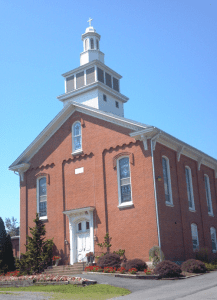
Lewisburg, PA
We welcomed a Muslim woman who served as prison chaplain. She told us about Islam and patiently answered our many questions. We had Jewish students and a Jewish professor talk to us about their faith. We had a woman talk to us about Unitarian Universalism. And we welcomed people of the Sikh and Buddhist traditions.
They were different than us – outsiders, foreigners. Yet this little country church decided to trust the Epiphany light of Christ and welcomed their gifts. We learned what we share in common as well as what is different. The visits by those wise women and men brought us gifts of understanding and peace.
In turn, each of our guests told me how much they appreciated their visit – the questions, discussions, and hospitality they experienced.
While they do not worship the Christ, they could certainly see the Epiphany light of Christ through us. This opened the way to new understanding, connections, and perhaps even friendship.
From the heavens, from the point of view of the stars, our differences are not visible, any more than we can notice distinctions between those planets at such a distance. Our Earth is simply part of another constellation, a green and blue orb swirled in vaporous clouds. Yet on this planet, God created life and saw fit to enter that life in all its messiness, all its beauty, all its danger, all its wonder.
Who knows, maybe some other being light years away is looking at us, making a wish upon our star.
Remember that the Epiphany light can shine through you. When people encounter you at church, at the dinner table, in the waiting line, in the office, in the car, on the Internet, anywhere on this planet, your light as a Christian should shine with peace and hospitality. Whether you are a stranger traveling or a host welcoming: receive the gifts offered to you with graciousness. And let the light of Christ shine in you so that they may see your good works and glorify God who is in Heaven. Amen.
Read also:
Light, Not Heat: Epiphany for a Burning World
Herod and Trump – Different Times, Same Story
5 Steps for a Healthy Pastor, Congregation, and Planet

The Rev. Dr. Leah D. Schade is the Assistant Professor of Preaching and Worship at Lexington Theological Seminary in Kentucky and ordained in the ELCA. Dr. Schade does not speak for LTS or the ELCA; her opinions are her own. She is the author of Preaching in the Purple Zone: Ministry in the Red-Blue Divide (Rowman & Littlefield, 2019) and Creation-Crisis Preaching: Ecology, Theology, and the Pulpit (Chalice Press, 2015). She is the co-editor of Rooted and Rising: Voices of Courage in a Time of Climate Crisis (Rowman & Littlefield, 2019). Her latest book, co-written with Jerry Sumney is Apocalypse When?: A Guide to Interpreting and Preaching Apocalyptic Texts (Wipf & Stock, 2020).
Leah is also co-founder of the Clergy Emergency League, a grassroots network of clergy that provides support, accountability, resources, and networking for clergy to prophetically minister in their congregations and the public square in this time of political upheaval, social unrest, and partisan division.
Twitter: @LeahSchade
Facebook: https://www.facebook.com/LeahDSchade/


